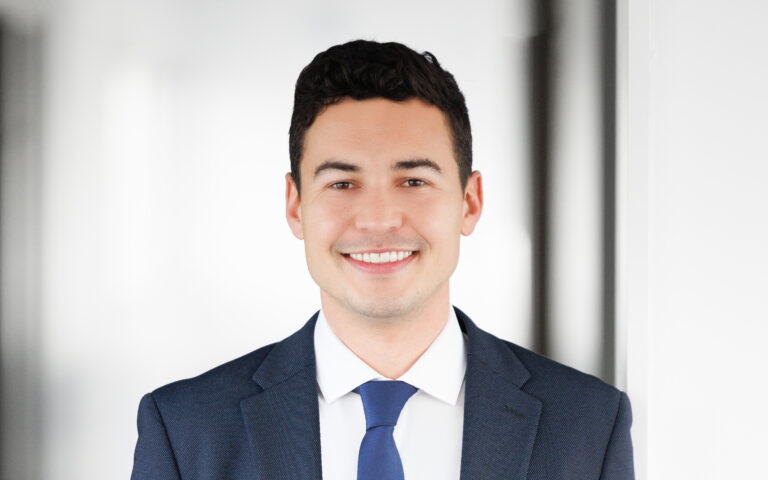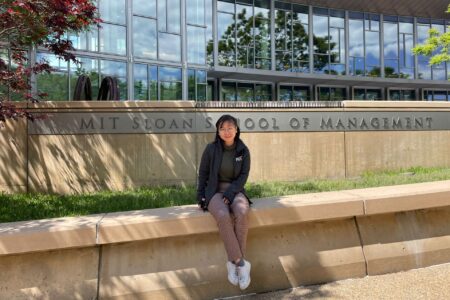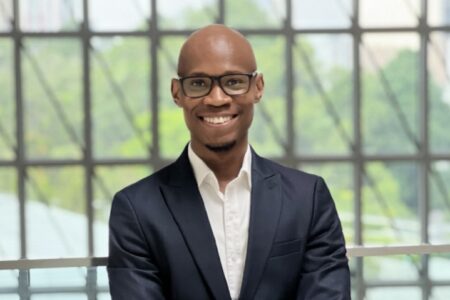
More than half of the world’s top 25 best business schools are in the US.
QS Global MBA Rankings 2024 lists Stanford Graduate School of Business, Wharton School, and Harvard Business School as the top three, trailed by 10others throughout the remaining top 25.
The rest of the list is followed by the UK with four schools, Spain with three, France with two, and Italy, Denmark, and Singapore with one each.
So, naturally, one might assume that if you’re already based in the US, pursuing your MBA in the US — where the world’s largest economy and many opportunities exist — makes the most sense.
Instead, Jordan Lewis decided to pursue his MBA in Europe. More specifically, he chose Portugal’s Porto Business School.

Lewis, third from the left, pictured with his group for their final MBA presentation. Source: AFP
Picking the best MBA for yourself
Born in Florida, US, Lewis moved to Puerto Rico when he was younger and completed his pre-college education there before moving back to Florida. He then enrolled at the University of South Florida and obtained his BS in Health Sciences and a BA in International Studies.
The reason behind his two degrees is simple.
While Lewis initially considered pursuing a healthcare career, which would require a health sciences degree, he eventually realised it wasn’t the right path. Instead, he turned his attention to another interest: international relations.
It was upon graduating, entering a role in international relations, and the subsequent career progression that led him to consider pursuing an MBA.
“I was working more on the commercial side of things and didn’t have the sort of business background, and so I wanted to be able to have a better foundation,” says Lewis.
It came down to Lewis’s surroundings and upbringing when deciding where to pursue his studies.
Working in Florida exposed him to many international businesses that have flocked to the state over the years.
The Osceola Chamber reports that in the first four months of 2024 alone, 163,992 new businesses formed in Florida. Data from the Securities and Exchange Commission shows that Florida was the number one state for corporate relocations in 2023, with 86% more corporations moving their headquarters there than moving out.
Not only that, but Florida acts as the gateway for business with Central America, South America, and the Caribbean. The state has an extensive Hispanic population; plenty of Spanish-speaking and Portuguese-speaking people make up that community.
Plus, as an American who grew up in Puerto Rico, Lewis is fluent in English and Spanish, two of the most spoken languages in the US. Portuguese, as a language, had an estimated mutual intelligibility of 50% to 60% with the Spanish language.
So, while Lewis’s International MBA classes in Portugal would be entirely in English, he would have the opportunity to immerse himself in a new culture and language that he was somewhat familiar with.
“And I wanted to have a value-add – I wanted to become fluent in Portuguese, which is one of the reasons I also decided to go to Portugal,” says Lewis.
That wasn’t all too – pursuing an MBA in the US can be expensive.
According to Education Data Initiative data from February 2024, the average cost of an MBA in the US is US$56,850.
Obtaining his MBA from Porto Business School, which consistently ranks within the top 50 best business schools in Europe, meant that Lewis could still have a quality education at a more affordable cost.
“In terms of value and preparation and the professors we have, it’s at a very high quality and standard,” he says. “We have professors from the University of Cambridge in the UK, NYU in New York, and IE in Madrid. So I could take the classes of these professors while in Portugal, which also let me meet my other goals.”

Value-add doesn’t just come in the form of financial rewards too. As Class Rep, Lewis (first on the left) led various fun extracurricular activities during his programme. Source: Jordan Lewis
How an MBA shapes the rest of your future
For Lewis, the value-add went beyond being based in Portugal and having professors flown into the country for the programme.
During the 15 months of his programme, Lewis took a project management class in Poland, attended a leadership class in Paris, and spent a week at the University of California, Berkeley.
Those experiences were grand and had their share of value-added, but Lewis believes the most valuable skills he gained were technical knowledge and soft skills.
Topics like advanced finance and quantitative methods were important lessons, and Lewis notes that the programme had several courses on negotiation and leadership, which turned out to be quite valuable.

There are always new adventures to be had in a new country, especially when you’re pursuing your MBA in Europe. Source: Jordan Lewis
However, there is one more skill that Lewis thinks is important above all, whether it is used within or outside an MBA, and that is asking for help.
“When you have help that’s available, like mentors for instance, or even if you don’t, it’s being able to ask for support when needed that’s important,” says Lewis. “Sometimes, you know, we can feel either embarrassed or shy, and you think, ‘I should know this. I shouldn’t be asking that question.’ But no – if you need help, and we all do, you need to ask for it.”
Being able to ask questions opens the doors to options too – something that Lewis believes is the key to success.
“I think success is to have options,” he says. “Being able to have the option, or being able to choose and decide to stay in the country, or to change your industry or sector, I think that’s being successful.”
“For me, the MBA was a way to increase my options.”










